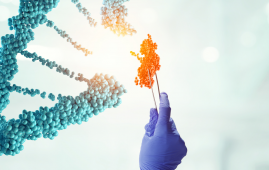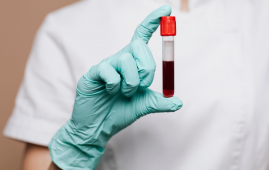

Dr. Tom Anchordoquy despises cancer. And, as a professor and researcher at the Skaggs School of Pharmacy and Pharmaceutical Sciences, he has spent the most of his career focusing on new ways to deliver medications to tumors. His most recent research, on the other hand, takes a different approach. Instead of focusing on drug delivery (getting more chemotherapy to the target tumor), this technique is more concerned with reducing chemotherapy side effects like hair loss, nausea, and loss of appetite,” Dr. Anchordoquy explained.
While chemotherapy is an important part of many cancer treatments, the nature of chemotherapy means that while it damages cancer cells, it also affects healthy cells, resulting in side effects that affect the individual’s physical health, quality of life, and emotional state. According to National Institutes of Health studies, 86% of cancer patient participants reported chemotherapy side effects ranging from minor to serious nausea and exhaustion. A reduction in the intensity of chemotherapy dose can be used to control a side effect, and there is evidence that individuals who undergo low-dose chemotherapy have lower survival rates.
Anchordoquy and his colleagues’ work has already demonstrated that reduced side effects allow for a higher dose of chemotherapy to be provided, resulting in better outcomes.
“Because of the reduced side effects, this approach could foreseeably be used to deliver a more aggressive drug regimen to the patient. Scott has shown with mice that have gotten this treatment, they are able to receive much higher doses of chemotherapy than the untreated mice. So much so, that they’re still alive.”
So, who exactly is Scott, and what precisely is this new treatment?
Scott Tilden is a PhD student who works in Anchordoquy’s lab. The only thing more important to Anchordoquy than cancer eradication is promoting student learning and recognition.
“Working with Tom has been a dream come true. He helped get me out of a bad situation during my first year of graduate school and ever since I have been grateful to work alongside him, “ Tilden said. “Too often I hear people talk about the problems and difficulties they have with their mentors, but from day one Tom has treated me like a peer and allowed me to succeed in ways I could not have imagined.”
Clearly, both the pupil and the mentor admire each other. Their collaborative research aims to take use of the body’s innate immune system. All of today’s vaccines, according to Anchordoquy, are based on the body’s adaptive immune system. This more advanced technology directly targets the type of germ responsible for infection. The older, intrinsic system, on the other hand, is not as complex and effectively shuts down all cells to the possible threat.
Anchordoquy explains the method with the use of a historical reference.
“When the innate immune system is activated it sends out an urgent message – like Paul Revere yelling ‘The British are coming!’ It’s not a specific message about a specific ‘soldier,’ but the body knows that something bad is coming,” he said. “All the tissues in your body hear ‘The British are coming!’ and the cells shut down and reduce the number of invaders that can get in.”
What about the cancer cells, though? Are they also shutting down? Anchordoquy has some exciting news.
“The cancer cells are deaf. They can’t ‘hear’ the message to shut down,” Anchordoquy explains. “So, while the immune signals are telling all the other cells to shut their doors, we administer chemotherapy in a virus-sized package that will enter the tumor.”
If this new method of administering chemotherapy seems thrilling, it is. Anchordoquy has applied for a patent, and the first iteration of the research was published in the Journal of Controlled Release.
“We are applying for funds to test this idea in a clinical trial, and we have hope that patients will experience much-reduced side effects while undergoing chemotherapy,” Anchordoquy said. “With fewer side effects, the cancer could be treated more aggressively and increase the chances of a cure.”
more recommended stories
 DNA Damage Triggers New Cell Death Pathway
DNA Damage Triggers New Cell Death PathwayTumor cells are killed by chemotherapy,.
 Comorbidities Worsen Sleep Quality in Multiple Sclerosis
Comorbidities Worsen Sleep Quality in Multiple SclerosisComorbidities in multiple sclerosis (MS) are.
 Latitude and Skin Type-Based Vitamin D Guidelines
Latitude and Skin Type-Based Vitamin D GuidelinesIn a recent study published in.
 AOMs Reduce CVD Risk in Obese Medicare Patients
AOMs Reduce CVD Risk in Obese Medicare PatientsObesity is a leading cause of.
 Dopamine Linked to Brain Development in ASD
Dopamine Linked to Brain Development in ASDSummary: A recent study links autism.
 Microplastics in Human Blood: Cardiovascular Risk
Microplastics in Human Blood: Cardiovascular RiskAn investigation disclosed in the esteemed.
 Gene Therapy Offers Hope for X-linked Sideroblastic Anemia
Gene Therapy Offers Hope for X-linked Sideroblastic AnemiaALAS2 gene mutations that are essential.
 Mini Brains: Advancing Alzheimer’s Research
Mini Brains: Advancing Alzheimer’s ResearchIn summary, scientists created microscopic “mini-brains”.
 Inflammatory Bowel Disease Linked to Parkinson’s Disease
Inflammatory Bowel Disease Linked to Parkinson’s DiseaseBoth inflammatory bowel disease (IBD) and.
 NMSC Skin Cancer: Rhenium-188 as Surgery Alternative
NMSC Skin Cancer: Rhenium-188 as Surgery AlternativeAccording to a recent study published.

Leave a Comment